Results
-
 £32.97
£32.97Christmas Singalong (Brass Band) Andrew Wainwright)
Arranged for The Illinois Brass Band for its 2019 Christmas concerts, this singalong gives your band the perfect opportunity to involve your audience and features attractive settings of Deck the Halls, The First Nowell, In the Bleak Midwinter and Joy to the World. Both Deck the Halls and Joy to the World feature two verses with optional cuts, should the decision be taken to include just one verse of either carol. In addition to a vocal part with the music and lyrics, a lyric sheet is also included for use by the audience. PDF download includes score and full set of parts, vocal part and lyric sheet. To view a rolling score video please visit www.youtube.com/watch?v=iwf9N19wmvg Difficulty Level: 3rd Section + Instrumentation: Vocal Soprano Cornet Eb Solo Cornet Bb Repiano Cornet Bb 2nd Cornet Bb 3rd Cornet Bb Flugel Horn Bb Solo Horn Eb 1st Horn Eb 2nd Horn Eb 1st Baritone Bb 2nd Baritone Bb 1st Trombone Bb 2nd Trombone Bb Bass Trombone Euphonium Bb Bass Eb Bass Bb Timpani Percussion 1-3
In Stock: Estimated dispatch 1-3 working days
-
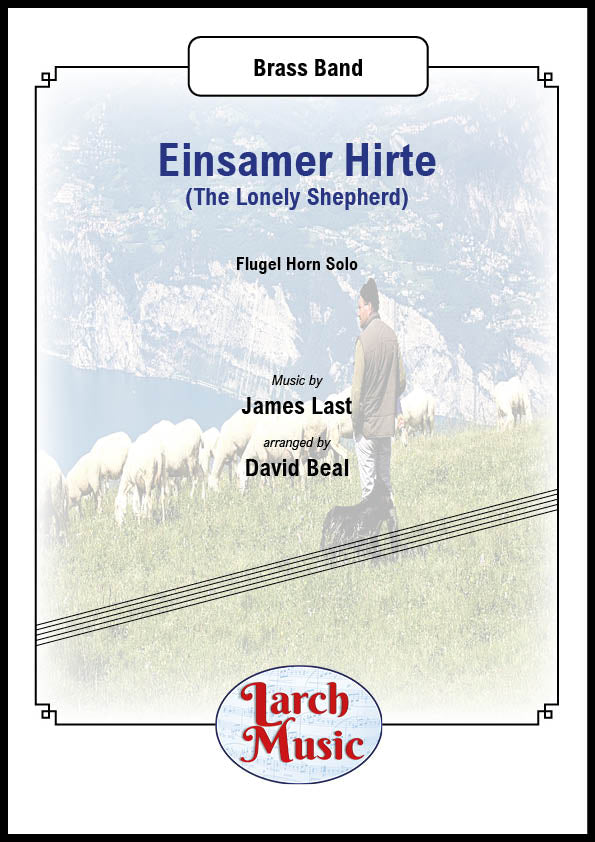 £21.50
£21.50Einsamer Hirte (The Lonely Shepherd) (James Last arr. by David Beal) - Flugel Horn & Brass Band Sheet Music Full Score and Parts - LM702
COMPOSER: James LastARRANGER: David BealA haunting solo from the pen of James LastOriginally composed for Georghe Zamfir on Panpipes but beautifully transcribed here for Flugel HornOne for the next concert to showcase your Flugel Horn playerOriginally, the title was planned for the albumFilmusik ohne Filmewhich was only to contain original compositions by James Last. This album was never released, so "The Lonely Shepherd " was published on Last's 1977 albumRussland Erinnerungen(Memories of Russia). In the same year, it was also released as a single, which reached 22nd on the music charts in Germany. With this recording, Gheorghe Zamfir, who had already published a number of records, succeeded in an international breakthrough. Among other things, he accompanied James Last in his 1978 tour."The Lonely Shepherd" has repeatedly been used as soundtrack. In 1979, it was used as the title theme for the six-part television seriesGolden Soak(Das Gold der Wuste) and again in 1984 in the Oscar-nominated animated short film "Paradise" In 2003, Quentin Tarantino used the recording as soundtrack in a scene and in the closing credits of his filmKill Bill: Volume 1.
In Stock: Estimated dispatch 3-5 working days
-
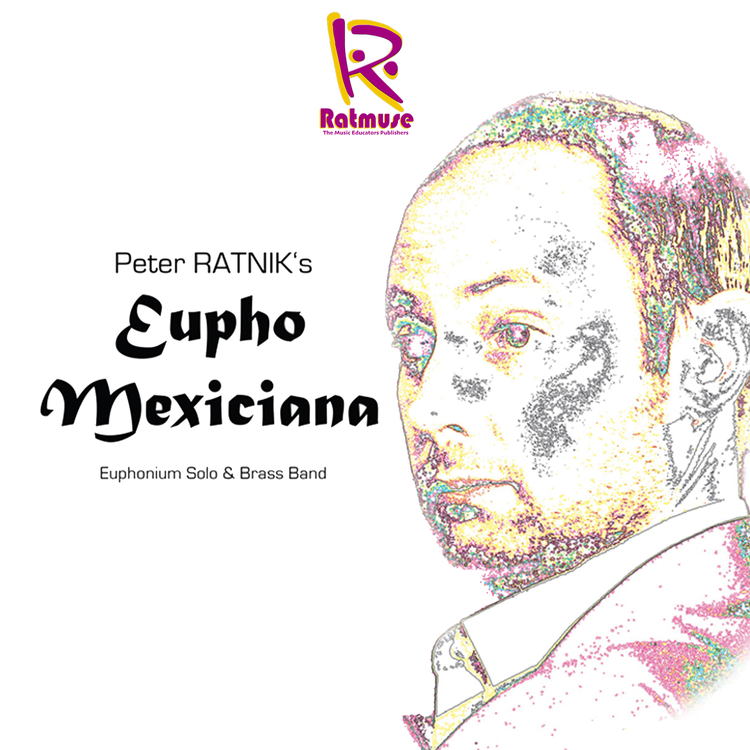 £35.00
£35.00Eupho Mexicana - Brass Band - RMP006 - Peter Ratnik
COMPOSER: Peter RatnikWritten for US Euphonium soloist Jason Ham, Peter Ratnik's Eupho Mexiciana is a show case of time changes, simple melodies and soaring Euphonium work. This is a must for the next world champion.CLICK HERE TO HEAR THIS PIECE - Eupho Mexiciana (Eupho Solo & Brass Band) by Peter Ratnik
In Stock: Estimated dispatch 3-5 working days
-
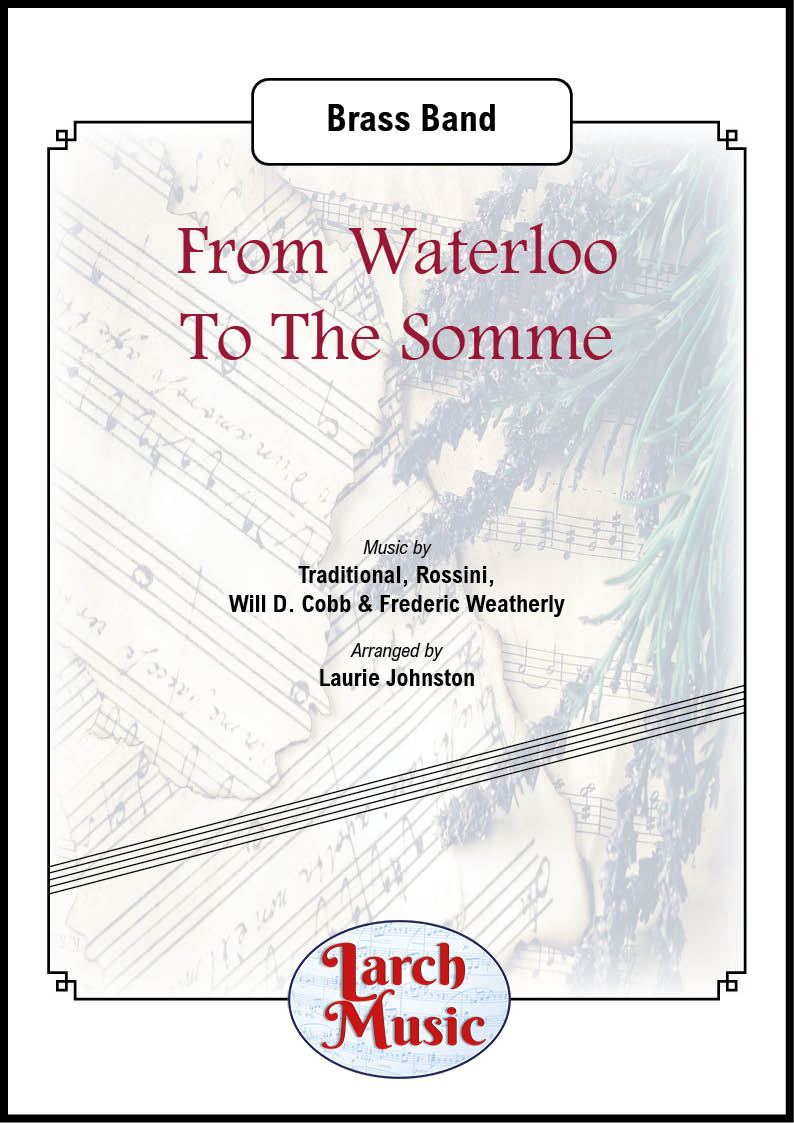 £25.00
£25.00From Waterloo To The Somme - Brass Band - LM774
COMPOSER: Traditional, Rossini, Will D. Cobb & Frederic WeatherlyARRANGER: Laurie JohnstonA great collection of war songs from The Battle of Waterloo to The SommeThe four main melodies in this piece are..1 Over the hills and Far Away.This song dates back as far as Queen Anne but was popular among soldiers during the Napoleonic Wars. Probably the most well known version these days is that by John Tams from the television series Sharpe.2 The Green Hills of Tyrol.This is one of the oldest tunes played by pipe bands today although originally written by Rossini for the William Tell ballet music. Pipe major John MacLeod of the 93rd Sutherland Highlanders heard it played by a Sardinian Military band during the Crimean War and transcribed it for pipes as a tribute to the number of VC's won by Scottish regiments in this conflict. It became very well known when Andy Stewart took the tune for his song The Scottish Soldier.3 Goodbye Dolly Gray.This is a music hall song by Will D. Cobb and was popularised as a Boer War anthem. It was written during the earlier Spanish - American and held it's popularity through to the first world war.4 Roses of Picardy.Written by Frederick Wetherly in 1916 it became a very big hit with the soldiers fighting in the trenches. Picardy is a region of northern France where the Somme battlefields are to be found which among other things possibly accounts for the songs great popularity. It sold on average 50.000 copies a month during the great war.
In Stock: Estimated dispatch 3-5 working days
-
 £25.00
£25.00Halcyon - Brass Band - MM020 - Tim Middleton
COMPOSER:Tim MiddletonA great new march from Tim MiddletonCommissioned for Busselton Brass Band' s 150th AnniversaryDuration: 3:22Brass Band Concert MarchThe Busselton Brass Band was founded in 1871 and celebrated its 150th anniversary in 2021.Named in honour of the whale-ship that shipwrecked in Geographe Bay in 1844, the march opens with a stately introduction and the main melody mimics the rise and fall of the ocean waves around the Busselton Jetty and town.The bass solo is inspired by the town's whaling and fishing history, and then returns to the original melody.The trio changes into 2/4 after the initial 6/8 contrasting the early years of Busselton and the more recent tourism and vineyard history. The trio also has a counter melody second time through to honour the band members who fought in World War I and II.At the end of the trio a D.C. to restate the opening themes, then a rousing finish at the end of the Bass Solo.A must for your summer concerts!
In Stock: Estimated dispatch 3-5 working days
-
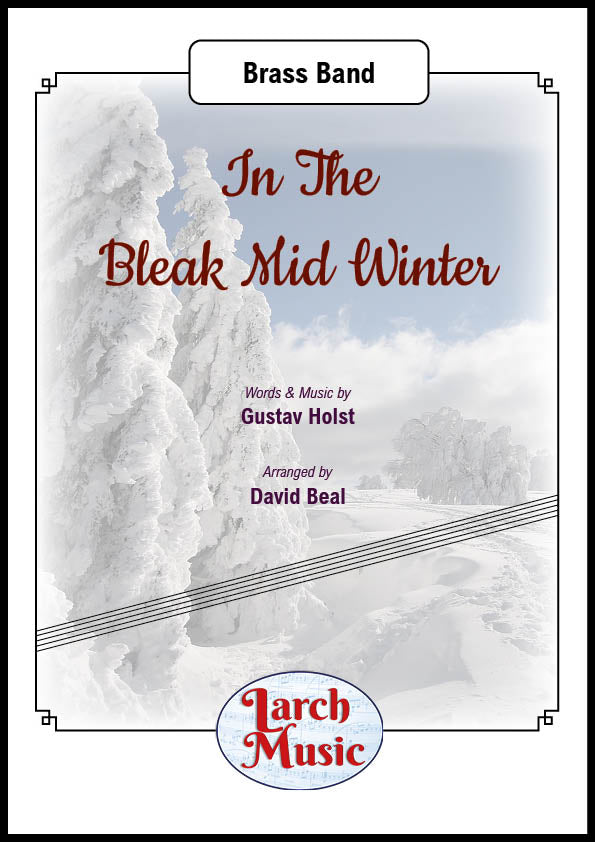 £25.00
£25.00In The Bleak Mid Winter - (Gustav Holst arr. David Beal) - Brass Band Sheet Music Full Score & Parts - LM600 - Gustav Holst
COMPOSER: Gustav HolstARRANGER: David BealA fantastic and haunting arrangement of the Gustav Holst tune "In The Bleak Mid Winter". A full band arrangement with solos from Solo Cornet and Flugel, with interjections from Repiano Cornet, 1st Baritone and Euphonium. This arrangement was specially written for The Shepherd Group Brass Band who recorded it for their Christmas CD.This arrangement is available now!Suitable for Youth section bands upwardsCD Available fromhttp://www.shepherdgroupbrassband.co.ukBrass Band Sheet Music Full Score & PartsLM600 - ISMN : 9790570006007
In Stock: Estimated dispatch 3-5 working days
-
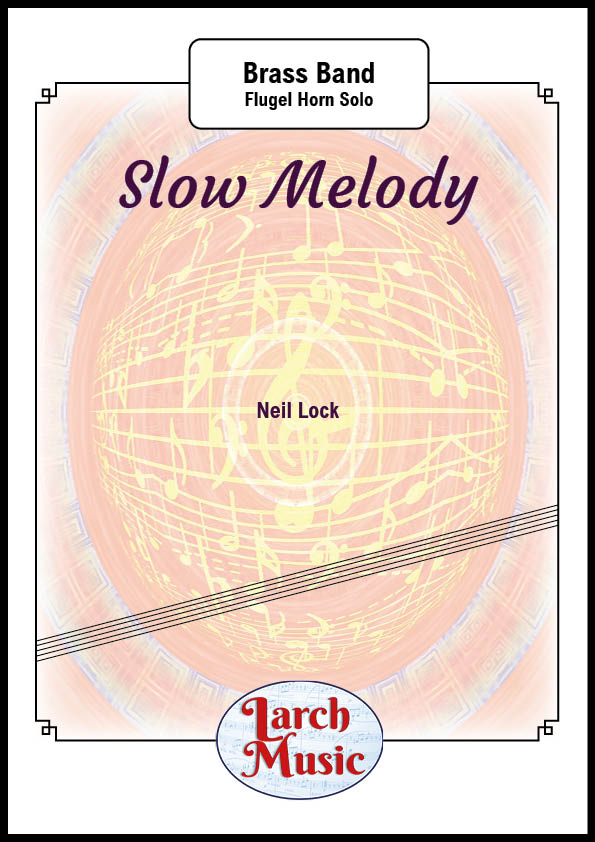 £30.00
£30.00Slow Melody - Brass Band (Flugel Horn Solo) Full Score & Parts - LM599
COMPOSER: Neil LockA delightful solo for Flugel Horn with brass band from the pen of Neil LockDelicately scored accompaniment to enable the soloist to shine through.Suitable for most bands
In Stock: Estimated dispatch 3-5 working days
-
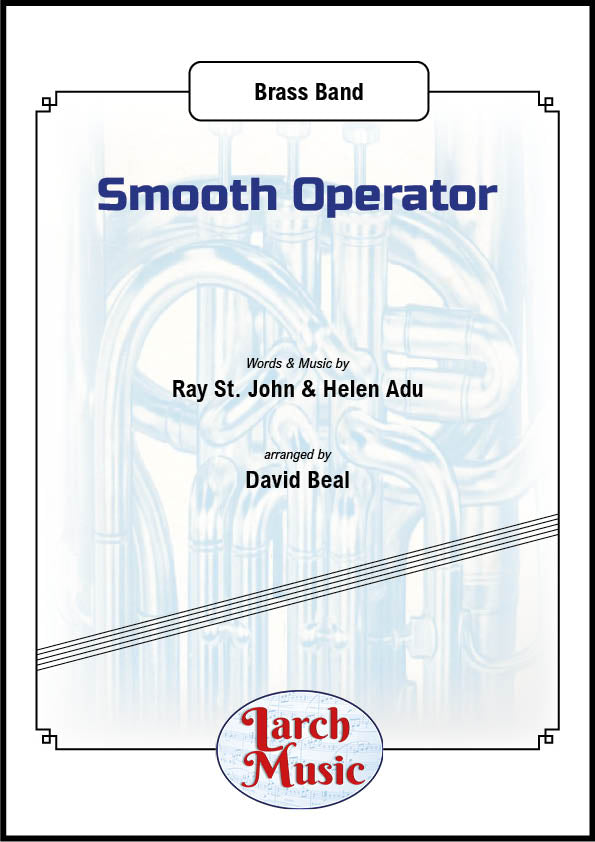 £30.00
£30.00Smooth Operator - Brass Band Sheet Music Full Score & Parts - LMAM032
COMPOSER: Ray St. John & Helen AduARRANGER: David Beal"Smooth Operator" is a song by English band Sade from their debut studio album, Diamond Life (1984), and was co-written by Sade Adu and Ray St. John. It was released as the album's third single in the United Kingdom as a 7-inch single with "Spirit" as its B-side, and as a 12-inch maxi single with "Smooth Operator" and "Red Eye" on side A and "Spirit" on side B. Released on 28 August 1984, it reached number 19 on the UK Singles Chart.In the United States, "Smooth Operator" was released in February 1985, serving as the album's second US single. The song became Sade's first top-10 entry in the US, peaking at number five on the Billboard Hot 100 for two weeks in May 1985. It spent 13 weeks in the top 40, and also topped the Billboard Adult Contemporary chart for two weeks.Although "Your Love Is King" remains Sade's highest-peaking single in the UK to date, "Smooth Operator" is the band's breakthrough single on the US charts, and their most successful single internationally.Scored here for British Brass Band.Any purchases from this site cannot be made please click on the link above
In Stock: Estimated dispatch 3-5 working days
-
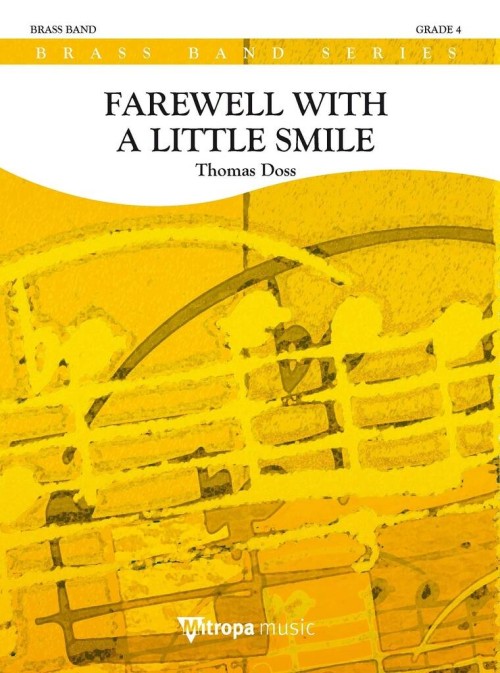 £52.50
£52.50Farewell with a Little Smile (Brass Band - Score and Parts) - Doss, Thomas
A farewell can have many faces: sad, happy, content, grateful... This special piece was composed as a heart-warming gift for an exceptional musician upon retirement from his beloved music society. The work carries an important message: every farewell is also an opportunity for a new beginning; a moment to cherish with a little smile.This atmospheric work opens with subdued, warm brass sounds that create a sense of intimacy. Through alternating (smaller) instrumentations, it builds up to a sonorous tutti climax, eventually leading to a subdued mood again. The closing passage offers room for reflection, memories, and gratitude. Farewell With a Little Smile is a beautiful, solemn composition suitable for countless occasions. Whether the work serves as a resting point in a concert programme or is used to frame a meaningful farewell, this music will add lustre to numerous precious moments.Duration: 6.30
Estimated dispatch 7-14 working days
-
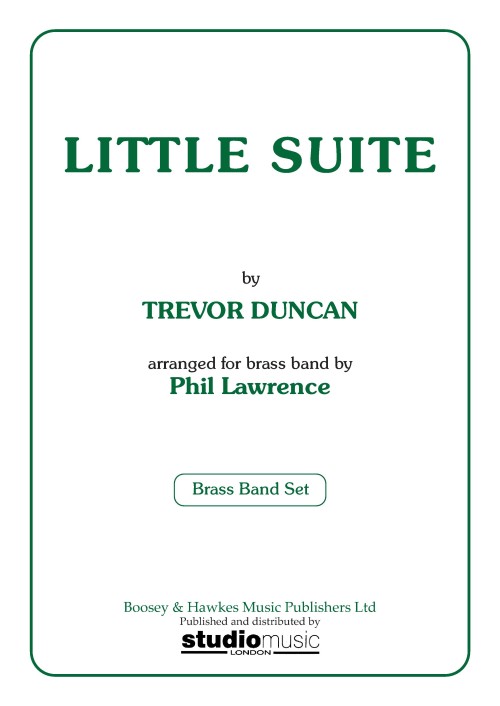 £42.95
£42.95Little Suite (Brass Band - Score and Parts) - Duncan, Trevor - Lawrence, Phil
Trevor Duncan -1924 -2005 was an English composer, particularly noted for his light music compositions. Born in London, and largely self-taught, he originally composed as a side line while working for the BBC. In the UK, he is well known for pieces such as High Heels and the March from A Little Suite, all of which gained fame as television and radio themes.Composed in 1959, and remembered by most for TV's Dr Finlay's Casebook fame, 'A Little Suite', was not necessarily inspired by Scotland, in fact it was more English in inspiration according to the composer. The piece was described by the composer as 'absolute music', and taking the three movements into account, this is not far from the mark.
Estimated dispatch 7-14 working days







